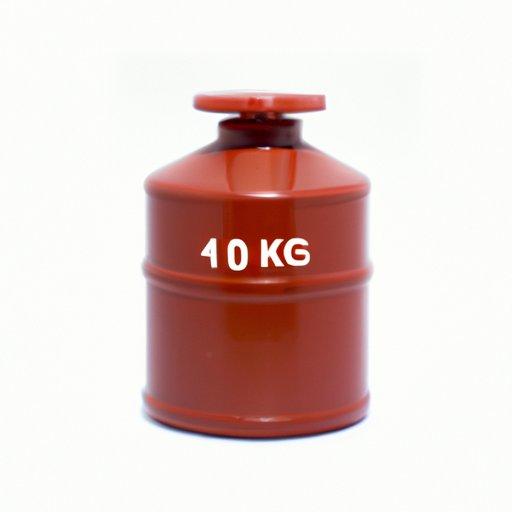
Introduction
Have you ever wondered how much a gallon weighs? It may seem like a simple question, but the answer can be quite complex. Understanding the weight of a gallon is essential for many everyday tasks, such as cooking, construction, and transportation. In this article, we will explore everything you need to know about the weight of a gallon, including why it’s important and how to calculate it.
The Ultimate Guide to Understanding the Weight of a Gallon
A gallon is a unit of measurement used to measure liquid volume. It originated in England during the 13th century and was later adopted by the United States. However, there are some differences in the values of gallons in the US and UK. In the US, a gallon is equivalent to 128 fluid ounces or 3.785 liters, while in the UK, a gallon is equivalent to 160 fluid ounces or 4.546 liters.
The weight of a gallon, also known as gallon weight, refers to the weight of the liquid contained in a gallon. The weight of a gallon can vary depending on the substance being measured. For example, a gallon of water weighs approximately 8.34 pounds, while a gallon of milk weighs around 8.6 pounds.
How Heavy is a Gallon? The Surprising Truth Revealed
To understand the weight of a gallon, we need to look at specific measurements and conversions for different liquids. Water, which is often used as a baseline for weight comparisons, weighs 8.34 pounds per gallon. Milk, on the other hand, weighs slightly more due to its richer composition, weighing approximately 8.6 pounds per gallon.
Gasoline, one of the most commonly used liquids in vehicles, weighs around 6.1 pounds per gallon. Other liquids like cooking oil and honey weigh even more, weighing approximately 7.2 pounds and 12 pounds per gallon, respectively.
Factors such as temperature and chemical composition can also affect the weight of a gallon. For example, maple syrup can weigh as much as 11 pounds per gallon, but its weight can also vary depending on its density and temperature.
Everything You Need to Know About Gallon Weight
Gallon weight is crucial because it plays an essential role in everyday life. For example, in cooking, measuring liquids by weight is a more accurate method of measuring than using volume. Similarly, in construction, understanding the weight of materials like concrete is vital to ensure that buildings and structures are built safely.
There are many common misconceptions about gallon weight, one of which involves the perception that all liquids weigh the same per gallon. As we have already seen, this is not the case, and understanding the weight of different liquids is essential to ensuring that proper measurements and quantities are used.
The Simple Method for Calculating the Weight of a Gallon
Calculating the weight of a gallon is relatively straightforward. You simply need to know the density of the liquid and multiply it by the volume of the gallon. The formula is as follows:
Density x Volume = Weight
As an example, let’s calculate the weight of a gallon of water:
1 g/cm³ x 3.785 liters = 8.34 pounds
If you prefer, you can use online conversion tools to make the process even more convenient.
Is a Gallon Heavy? Let’s Find Out
The weight of a gallon can vary widely depending on the liquid being measured. However, on average, a gallon of liquid can be considered heavy, especially if you need to handle it. A gallon of water, for example, weighs approximately 8.34 pounds, which can be challenging to carry for prolonged periods.
To put this weight into perspective, it’s the weight of two standard-sized laptops, or a set of dumbbells of around 5 kg each. When transporting heavy gallon containers, it’s important to lift with your legs and not your back, as this can cause injury.
Why Understanding the Weight of a Gallon is Important
Understanding the weight of a gallon is important because it can help you make more accurate measurements and estimates. In cooking, measuring liquids by weight is more precise than using volume, and it can help ensure that recipes turn out the way they are intended.
Similarly, in construction, understanding the weight of building materials is crucial to ensuring safe and stable structures. In transportation, understanding the weight of cargo is essential to ensuring that vehicles are not overloaded and can be driven safely.
Exploring the Different Weights of Various Liquids by the Gallon
In addition to water and milk, some other common liquids you may be interested in knowing the weight of include:
- Gasoline: 6.1 pounds per gallon
- Cooking oil: 7.2 pounds per gallon
- Maple syrup: 11 pounds per gallon
- Honey: 12 pounds per gallon
- Vinegar: 8.34 pounds per gallon
- Beer: 8.34 pounds per gallon
In fact, you can calculate the weight of any liquid by using its density and volume, as discussed earlier in this article.
Conclusion
The weight of a gallon is an important measurement that can vary widely depending on the substance being measured. Understanding the weight of a gallon is essential for many everyday tasks, including cooking, construction, and transportation. By using online conversion tools or calculating the weight yourself, you can achieve more accurate results and prevent potential problems with overloaded cargo or inaccurate recipes.
Remember to handle heavy gallon containers safely to avoid injury, and explore the different weights of various liquids to gain a deeper understanding of gallon weight. By understanding the weight of a gallon, you can make more informed decisions and improve your ability to measure and estimate quantities accurately.
Additional resources for further reading and learning about the weight of a gallon include online conversion tools, instructional videos, and articles on specific liquids and their weights.





